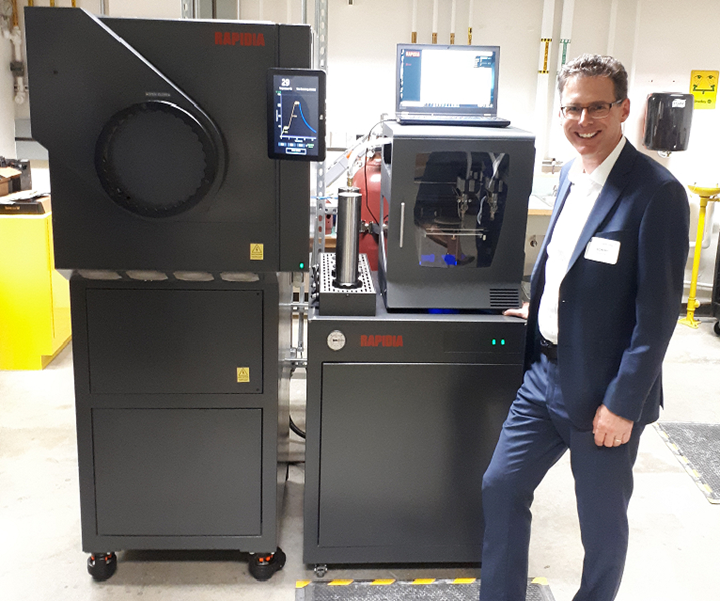Rapidia Installs First 3D Metal Printer
Rapidia Inc. has announced the start of commercial shipments and the installation of its first system at Hatch Accelerator, a start-up incubator which is part of the University of British Columbia.

Professor Robert Rohling, director of the Hatch Accelerator at UBC, in front of the newly installed system.
Rapidia Inc., the Canadian company that developed the worlds first debinding free bound metal 3D printer, has announced the start of commercial shipments and the installation of its first system. The company’s first customer is Hatch Accelerator, a start-up incubator which is part of the University of British Columbia (UBC). The Rapidia system will serve several start-ups located at the Hatch Accelerator. Several more installations are planned over the next few months.
The Rapidia system is said to use water-based metal paste, eliminating the solvent-based debinding step. Eliminating debinding allows printing 100% solid thick section without infill patterns, for maximum strength. It has several support modes enabling complex internal structures. It is said to have a fast turn-around time, going from a CAD file to a finished metal part in about 24 hours. According to the company, it has an extremely low cost per part.
The system was first announced at the 2019 Rapid+TCT show. See the system at the 2019 CMTS show in Toronto, September 30-October 3 at booth 1937.
Related Content
-
Beehive Industries Is Going Big on Small-Scale Engines Made Through Additive Manufacturing
Backed by decades of experience in both aviation and additive, the company is now laser-focused on a single goal: developing, proving and scaling production of engines providing 5,000 lbs of thrust or less.
-
3D Printed NASA Thrust Chamber Assembly Combines Two Metal Processes: The Cool Parts Show #71
Laser powder bed fusion and directed energy deposition combine for an integrated multimetal rocket propulsion system that will save cost and time for NASA. The Cool Parts Show visits NASA’s Marshall Space Flight Center.
-
AM 101: What Is Binder Jetting? (Includes Video)
Binder jetting requires no support structures, is accurate and repeatable, and is said to eliminate dimensional distortion problems common in some high-heat 3D technologies. Here is a look at how binder jetting works and its benefits for additive manufacturing.










